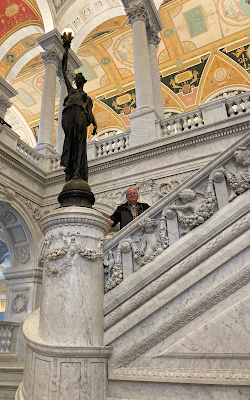 |
| Me in the Library of Congress, just because. |
I've had a quick correspondence with a college librarian writing a research paper on "genre use and promotion both in libraries and outside of library settings" with an eye toward improving how the Library of Congress categorizes books. She wanted input from authors in unusual genres and I was happy to oblige.
I answered her questions as best I could and liked one of them enough that I asked if I could post it here. I think it's a good summary of how I approach the job. I have no idea if my perspective is common or ideal. It's just mine.
. . . . . . .
1. What is your philosophy/reason behind creating works in various genres and subgenres? What purposes are you hoping genres will serve for your audiences?
First, just to clarify (and I suspect we’re on the same page here), I don’t consider comics or graphic novels a genre, which is worth mentioning because many people do. They are a medium that encompasses many genres, including those you mention: science fiction, nonfiction, memoir, etc.
That out of the way, I don’t know how to answer this question and I doubt many authors would. We write the stories we want or need to write. I’ve given almost no thought to which genre I’m working in or onto which shelf a bookstore or library will place my work. As Orson Welles said to a critic who asked him to analyze one of his films, “I’m the bird. You’re the ornithologist.”
That may be professional malpractice on my part.
I’ve written two graphic novels that I’d call nonfiction memoir (Mom’s Cancer and A Fire Story). Mom’s Cancer also crosses into graphic medicine, a subgenre that didn’t exist when I wrote it. I’ve seen A Fire Story described as a work of “climate grief,” which may become a notable subgenre of its own if climate change goes as projected. I’ve called my second book, Whatever Happened to the World of Tomorrow, historical fiction but don’t know if that’s accurate (I wanted to call it a “graphic polemic” but my publisher wouldn’t let me). My latest, The Last Mechanical Monster, is straight-up science fiction/fantasy.
Each was a story I felt compelled to tell, and which genre it fell into barely crossed my mind.
(I did devote quite a bit of time and thought deciding if Last Mechanical Monster was science fiction or fantasy and came up with an answer that satisfied me but made no difference in the marketing, placement, or audience for the book that I could tell.)
I’d say that I don’t choose genres, genres choose me.
Likewise, I give very little thought to serving an audience when writing a book. I want to tell a good story I’d want to read and nobody but me could write. I aim to make a book my editor would want to publish and my family would be proud of. They’re my audience. I’d be thrilled if many, many other people read and love it, but that’s beyond my control so I try not to fret about it.
The only time I recall worrying about a broader audience was when my editor and I discussed whether to include an obscenity in A Fire Story. We knew it would exclude us from the young reader market but decided to include the word for journalistic authenticity and because we couldn’t think of an alternative that wasn’t stupid.
Honestly, I treat all the work I do, even my fiction, as journalism. I just try to write and draw what happened as clearly and economically as I can, even if I made it all up. As a result, my approach to memoir, graphic medicine, historical fiction, and science fiction/fantasy has been pretty much the same: tell it straight, with some tone-shifting to help readers keep their bearings. A nonfiction book about cancer should not have the same tone as a light fantasy about a giant robot.
No comments:
Post a Comment